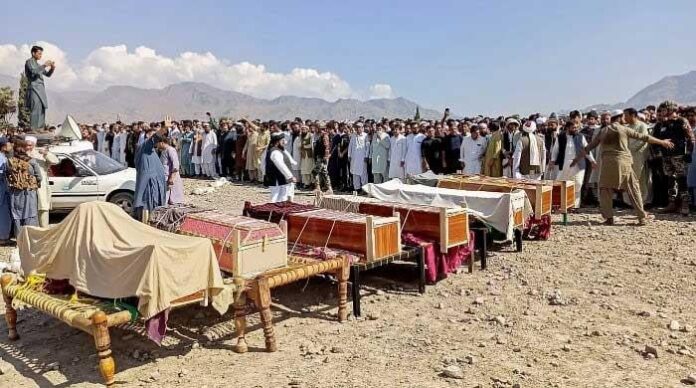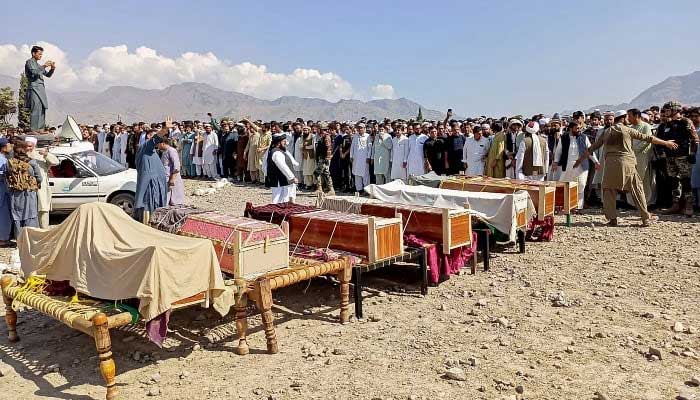The Khyber Pakhtunkhwa government has declared Kurram a “disaster-hit” district following months-long tribal clashes, which claimed lives of at least 133 people, and also ramped up relief efforts to address acute shortage of necessary items, including food and medicines.
“The provincial government has directed authorities concerned to expedite relief operations in the [violence-marred district],” says KP government spokesperson Barrister Saif in a statement after the cabinet’s meeting, which was chaired by Chief Minister Ali Amin Gandapur.
He added that authorities were ensuring the provision of medicines and food items during the relief emergency. “The relief operation includes provision of medicines, food, and transportation via airborne service.”
The prolonged roadblock has led to severe shortages of essential supplies in Parachinar, including food items, medicines, fuel, firewood, and LPG, while daily life and economic activities remain heavily impacted as a result.
Tribal clashes have killed more than 200 people since July, with various truces announced since the latest round of fighting began, as elders from the two sides negotiate a lasting agreement.
In the meantime, the government has shut down key roads in and out of the district in an attempt to quell the violence, after a security convoy escorting residents was attacked in November, leaving more than 40 dead.
At least 133 people have since been killed and 177 wounded in sporadic clashes since the incident.
During today’s provincial cabinet meeting, the participants were briefed that a number of jirgas were held to ensure a sustainable solution to the tribal dispute.
At least 10 tonnes of medicines were delivered via airborne service to address the shortage of medicines in Kurram, the participants were briefed. Furthermore, wheat was being provided at “concessional rates” to ensure the availability of food commodities.
Meanwhile, the government has also launched a helicopter service to resolve transportation problems. At least 220 people were transported via helicopter within two days. The participants were apprised of another decision regarding establishing road safety checkposts.
Regarding the road closure, the attendees were briefed that the artery would be re-opened after an agreement between both tribes. Moreover, a Federal Investigation Agency (FIA) cell would be established against social media accounts spreading sectarian hatred.
The KP cabinet also decided to establish a desk in the Home Department for issuing licenses for weapons. It was also decided to demolish the bunkers established in the area by February 1, they were briefed.
‘Tribal issue, not terrorism’
Speaking during the meeting, KP CM Gandapur said that the people of Kurram want peace, adding that the issue is not terrorism-related but a conflict between two groups.
He also castigated “some elements” for worsening the situation by spreading sectarian hatred, saying that they were creating false narratives to give a “different colour to the Kurram issue”.
The chief minister also said that illegal heavy weapons abound in the violence-hit district. “There is no justification for possessing so many weapons and forming bunkers,” he said, adding that no government’s policy allows armed groups to possess illegal heavy weapons.
“The KP government is seeking a peaceful solution to the issue through talks and jirgas,” he said, clarifying that no decision has been made to conduct operations in Tirah Valley and Jani Khel.
‘Pragmatic measures’
Meanwhile, the cabinet documents — a copy of which is available with Geo News — revealed that the government has decided to take pragmatic measures to maintain law and order in the region.
A grant jirga would be organised in Kurram for a longer period to ensure sustainable peace efforts. The provincial government has also requested the Centre to deploy Frontier Corps (FC) in the district.
Furthermore, the documents revealed that the government has issued a grant for the purchase of special bomb-proof vehicles for the district police officer (DPO) of Peshawar, Kohat, Bannu, Dera Ismail Khan, and Malakand.
All trouble makers are to be classified as “terrorists”, including those mentioned in FIRs. It has also been decided to include names of “troublemakers” in Schedule IV. The government would take “unbiased ruthless action against all of them without fear or favour.”
The documents stated that all bunkers would be taken over, and demolished, while all heavy weapons would be deposited with the government.








